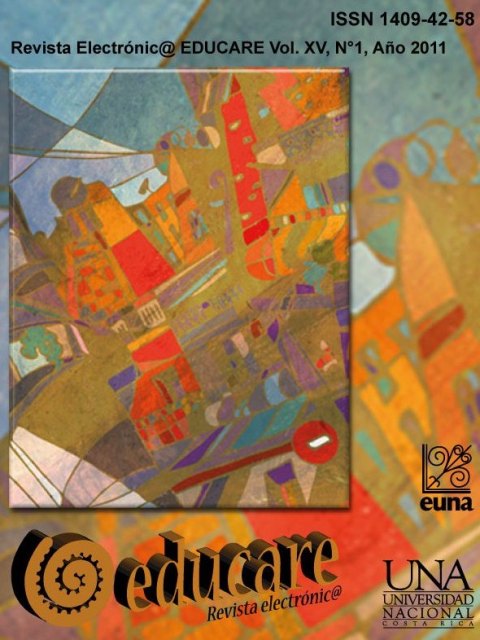Higher Education in a Context of Postmodernity: Understanding and Reconciliation
DOI:
https://doi.org/10.15359/ree.15-1.1Keywords:
Postmodernism, higher education, relativism, freedom of speechAbstract
This paper aims at promoting reflection and awareness about the need of a closer understanding among professors, authorities and university students on how higher education (purpose and goals) is perceived today. The study compares the Modernist and Postmodern perspectives of society and education, in order to identify the main points of divergence, as well as the possible ways of consensus. As a conclusion, new spaces are proposed to find intersubjectivity agreements, as a way to achieve the objective stated.
References
Habermas, J. (1987). The Philosophical Discourse of Modernity: twelve lectures [El discurso filosófico
y la modernidad: Doce conferencias]. Cambridge, MA; MIT Press.
Hicks, S. (2004). Explaining Postmodernism: Skepticism and Socialism from Rousseau to
Foucault [Explicación del postmodernismo: Escepticismo y socialismo, de Rousseau a
Foucault]. Arizona: Scholargy Publishing.
Hollinger, D. (1995). Postethnic America: Beyond Multiculturalism [La América post-étnica: Más
allá del multiculturalismo]. New York: Basic Books.
Leicester, M. (2000, enero-febrero). Post-Postmodernism and Continuing Education [El postmodernismo
y la educación continua]. International Journal of Lifelong Education, 19(1), 73-81.
Nguyen, C. (2010, August). The Changing of Postmodern University [La cambiante universidad
postmoderna]. International Education Studies, 3(3), 88-99. Recuperado de http://www.
ccsenet.org/journal/index.php/ies/article/view/6052/5300
Strohl, N. (2006). The Postmodern University Revisited: Reframing Higher Education Debates from the
‘two cultures’ to postmodernity [Revisitando la universidad postmoderna: Un replanteamiento
de los debates en torno a la educación superior de las “dos culturas” a la postmodernidad].
London Review of education, 4(2), 133-148. doi: 10.1080/14748460600855195
Tierney, W. G. (2001). The Autonomy of knowledge and the Decline of the Subject. Postmodernism
and the Reformulation of the University [La autonomía del conocimiento y la mengua del
sujeto. El postmodernismo y la reformulación de la universidad]. Higher education, 41(4),
-372. doi: 10.1023/A:1017588907541
Usher, R. y Edwards, R. (1994). Postmodernism and education [El postmodernismo y la educación].
London: Routledge.
Wittgenstein, L. (2003). Tractatus Logico-Philosophicus [Tratado lógico-filosófico]. Madrid, Spain:
Alianza.
Downloads
Published
How to Cite
Issue
Section
License
1. In case the submitted paper is accepted for publication, the author(s) FREELY, COSTLESS, EXCLUSIVELY AND FOR AN INDEFINITE TERM transfer copyrights and patrimonial rights to Universidad Nacional (UNA, Costa Rica). For more details check the Originality Statement and Copyright Transfer Agreement
2. REUTILIZATION RIGHTS: UNA authorizes authors to use, for any purpose (among them selfarchiving or autoarchiving) and to publish in the Internet in any electronic site, the paper´'s final version, both approved and published (post print), as long as it is done with a non commercial purpose, does not generate derivates without previous consentment and recognizes both publisher's name and authorship.
3. The submission and possible publication of the paper in the Educare Electronic Journal is ruled by the Journal’s editorial policies, the institutional rules of Universidad Nacional and the laws of the Republic of Costa Rica. Additionally, any possible difference of opinion or future dispute shall be settled in accordance with the mechanisms of Alternative Dispute Resolution and the Costa Rican Jurisdiction.
4. In all cases, it is understood that the opinions issued are those of the authors and do not necessarily reflect the position and opinion of Educare, CIDE or Universidad Nacional, Costa Rica. It is also understood that, in the exercise of academic freedom, the authors have carried out a rogorous scientific-academic process of research, reflection and argumentation thar lays within the thematic scope of interest of the Journal.
5. The papers published by Educare Electronic Journal use a Creative Commons License:














 The articles published by Educare Electronic Journal can be shared with a Creative Commons License:
The articles published by Educare Electronic Journal can be shared with a Creative Commons License: 



